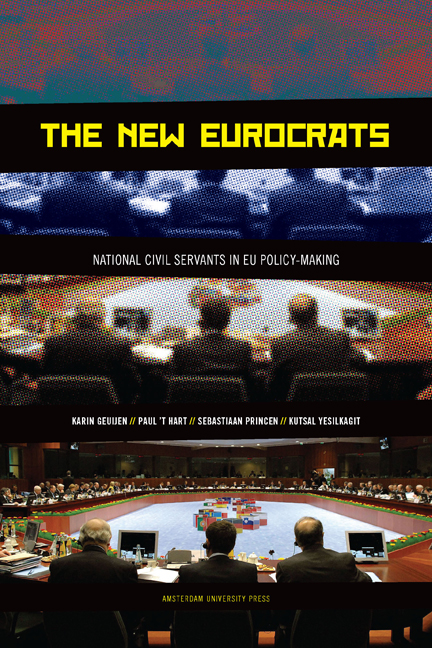Book contents
- Forntmatter
- Contents
- Tables and Figures
- Acknowledgements
- Chapter One Studying Eurocrats At Work
- Chapter Two Toward a Europeanised Civil Service? a Survey Study
- Chapter Three Eurocratic Work As Strategic Behaviour: Moving Before the Commission Does in Veterinary Policy
- Chapter Four Getting Things Done in European Police Co-Operation
- Chapter Five Bridge Builders Or Bridgeheads in Brussels? the World of Seconded National Experts
- Chapter Six Understanding Eurocratic Work: Conclusions and Reflections
- Appendix: Items on Europeansation Included in the ‘Pomo’ Survey
- Notes
- Bibliography
- About the authors
- Index
Chapter Two - Toward a Europeanised Civil Service? a Survey Study
Published online by Cambridge University Press: 15 January 2021
- Forntmatter
- Contents
- Tables and Figures
- Acknowledgements
- Chapter One Studying Eurocrats At Work
- Chapter Two Toward a Europeanised Civil Service? a Survey Study
- Chapter Three Eurocratic Work As Strategic Behaviour: Moving Before the Commission Does in Veterinary Policy
- Chapter Four Getting Things Done in European Police Co-Operation
- Chapter Five Bridge Builders Or Bridgeheads in Brussels? the World of Seconded National Experts
- Chapter Six Understanding Eurocratic Work: Conclusions and Reflections
- Appendix: Items on Europeansation Included in the ‘Pomo’ Survey
- Notes
- Bibliography
- About the authors
- Index
Summary
Surveying the Dutch civil service
Before we touch upon this book's main objective – to find out more about how Dutch national bureaucrats ‘do EU business’ – we first have to answer the obvious question: who are these people? How many officials in Dutch national government ‘do European business’ on a more than incidental basis? And which organisations within the Dutch public service do they tend to work for? Perhaps surprisingly, this obvious question has never been answered before. On the individual level, we do not know how many Dutch civil servants are involved in EU-related activities and what kinds of activities they are involved in. On the organisational level, the questions include how EU-related activities are embedded in different parts of Dutch national government and how EU-related work is managed and facilitated organisationally.
To address this deficiency, we conducted a large-scale survey among civil servants working for organisations in Dutch national government. In doing so, we were able to use data from a biennial civil servant personnel survey that the Dutch Ministry of the Interior conducts. This so-called ‘POMO’ survey included a range of questions concerning the jobs and careers of individual civil servants as well as their personal backgrounds. We included four questions on EU-related activities in the questionnaire for the 2006 version of the POMO survey. These questions are reproduced (translated from Dutch into English) in appendix I of this book.
In terms of population, the survey included all Dutch national government ministries, except the Ministry of Defence. Moreover, it also covered four large semi-autonomous executive agencies: Tax Department, Public Works and Water Management Agency, Immigration and Naturalisation Services, and Prison Services. From this group of some 90,000 civil servants, a random sample of 10,000 respondents was drawn. The survey could be completed on paper or online. In the end, 4,502 civil servants responded, yielding a response rate of 45%.
The questions focused on producing an overall picture of EU involvement among civil servants as well as the organisational management of and support for EU-related job activities. To get these results, respondents were first asked to indicate if their work was affected by the EU. To emphasise the effects of the EU on their work (rather than their organisation, policy sector or policies in general), the question referred to a list of eight types of EU-related activities that we discerned.
- Type
- Chapter
- Information
- The New EurocratsNational Civil Servants in EU Policy-making, pp. 31 - 50Publisher: Amsterdam University PressPrint publication year: 2008



